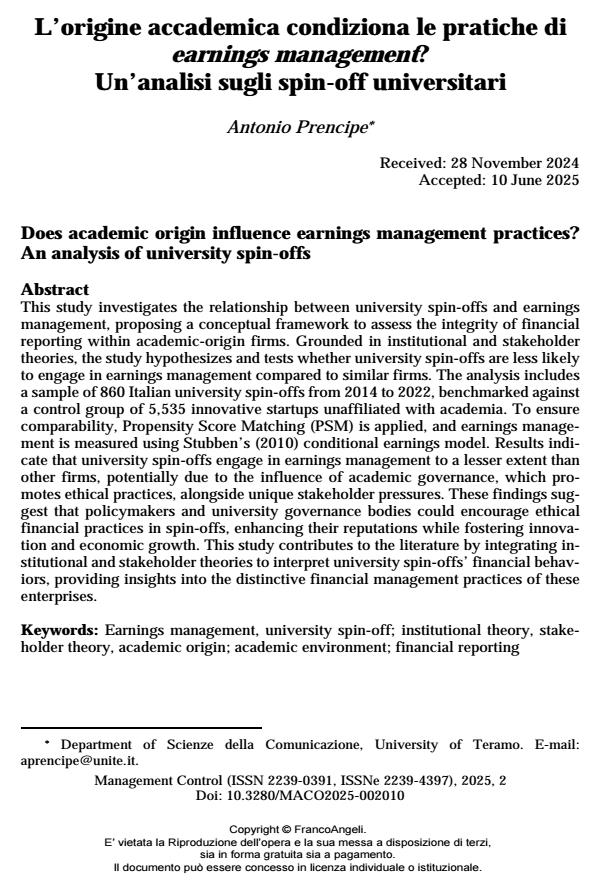L’origine accademica condiziona le pratiche di earnings management? Un’analisi sugli spin-off universitari
Titolo Rivista MANAGEMENT CONTROL
Autori/Curatori Antonio Prencipe
Anno di pubblicazione 2025 Fascicolo 2025/2
Lingua Italiano Numero pagine 27 P. 205-231 Dimensione file 174 KB
DOI 10.3280/MACO2025-002010
Il DOI è il codice a barre della proprietà intellettuale: per saperne di più
clicca qui
Qui sotto puoi vedere in anteprima la prima pagina di questo articolo.
Se questo articolo ti interessa, lo puoi acquistare (e scaricare in formato pdf) seguendo le facili indicazioni per acquistare il download credit. Acquista Download Credits per scaricare questo Articolo in formato PDF

FrancoAngeli è membro della Publishers International Linking Association, Inc (PILA), associazione indipendente e non profit per facilitare (attraverso i servizi tecnologici implementati da CrossRef.org) l’accesso degli studiosi ai contenuti digitali nelle pubblicazioni professionali e scientifiche.
This study investigates the relationship between university spin-offs and earnings management, proposing a conceptual framework to assess the integrity of financial reporting within academic-origin firms. Grounded in institutional and stakeholder theories, the study hypothesizes and tests whether university spin-offs are less likely to engage in earnings management compared to similar firms. The analysis includes a sample of 860 Italian university spin-offs from 2014 to 2022, benchmarked against a control group of 5,535 innovative startups unaffiliated with academia. To ensure comparability, Propensity Score Matching (PSM) is applied, and earnings management is measured using Stubben’s (2010) conditional earnings model. Results indicate that university spin-offs engage in earnings management to a lesser extent than other firms, potentially due to the influence of academic governance, which promotes ethical practices, alongside unique stakeholder pressures. These findings suggest that policymakers and university governance bodies could encourage ethical financial practices in spin-offs, enhancing their reputations while fostering innovation and economic growth. This study contributes to the literature by integrating institutional and stakeholder theories to interpret university spin-offs’ financial behaviors, providing insights into the distinctive financial management practices of these enterprises.
Parole chiave:Earnings management, university spin-off; institutional theory, stakeholder theory, academic origin; academic environment; financial reporting
Antonio Prencipe, L’origine accademica condiziona le pratiche di earnings management? Un’analisi sugli spin-off universitari in "MANAGEMENT CONTROL" 2/2025, pp 205-231, DOI: 10.3280/MACO2025-002010